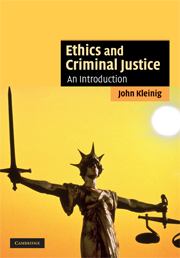4 - Tensions within the police role
Published online by Cambridge University Press: 05 June 2012
Summary
Police are occupied with peacekeeping – but preoccupied with crime fighting.
Evolution of the police role
Classical liberals had a clear but rather simple view of the police role. According to that view police were “enforcers” who (along with those who were needed to oversee the decisions of the courts) were to ensure that those who violated the rights of others answered for their wrongdoing. But already when the police organizations with which we are now familiar came into being in the nineteenth century, the emphasis was on crime prevention rather than mere law enforcement: crime represented a failure in policing rather than just the occasion for it. Our current understanding of the police role is rather less clear and police are now frequently conflicted about it themselves, some finding their role, at times, more accurately describable as “crisis management” than as “law enforcement” or even as “crime prevention.” And what is termed and now frequently fostered as “community policing” is sometimes seen as less or other than “real” policing.
To shed light on what the current social role of police is and how this contrasts with the way in which the police role was theoretically conceived by classical theorists of individual rights and dignity, we would do well to remember that their understanding flowed from their view of the limited role of government: governmental structures were instituted to secure individual rights against interference by others – the “others” being not only individuals but also institutions such as the monarchy and the church.
- Type
- Chapter
- Information
- Ethics and Criminal JusticeAn Introduction, pp. 51 - 70Publisher: Cambridge University PressPrint publication year: 2008



